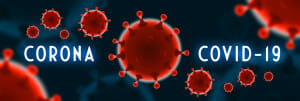
Coronavirus – 2020’s Unanticipated Pandemic
The coronavirus emerged in December 2019 and has gradually caused a worldwide health crisis. More than 175,000 globally have been sickened with the unanticipated virus. Also, more than 6,700 have unfortunately passed away as a result of it. The virus first appeared in Wuhan, a Chinese city. Health officials are still tracing the exact source of the new corona strain.
What even is the Coronavirus or COVID-19?
COVID-19 is a recent illness that can impact your airways and lungs. A virus called the coronavirus is the cause of COVID-19. Coronaviruses (CoV) are a big family of viruses that induce illness. These range from a typical cold to more severe diseases. COVID-19 is the most recent strain to be discovered.
Symptoms: Fact and Fiction
Similarities lie between the most recent coronavirus type and cold/flu. So, appearances aren’t a trustworthy indicator of whether someone has the virus or not. Fever and/or dry cough are common symptoms. Also, Fatigue, aches & pains, a sore throat, headaches and shortness of breath are symptoms that are sometimes in cases of COVID-19. A runny or stuffy nose, as well as diarrhoea, are rare symptoms. Sneezing isn’t considered a COVID-19 symptom. It also has been noted that 97.5% of those who’ve developed symptoms showed up within 11.5 days of infection.
How long does it stay on surfaces?
Naturally, we’ll come into contact with different surfaces – it’s inevitable! After researchers exposed various materials to COVID-19 in the lab they found the following. Firstly, they found that it stayed virulent on surfaces for a long period. The virus can last for up to two to three days on stainless steel as well as plastic. Additionally, the virus can last on cardboard for up to 24 hours, which isn’t as bad but can still pose risks.
Spreading of the virus
Spreading the virus can be minimised in a few ways. Practising proper hand hygiene is extremely effective. You should cough and sneeze into a tissue or your elbow to minimise spreading. Then you should throw the tissue into the bin immediately, and wash your hands as soon as possible. It’s important that you frequently clean surfaces, clothes and objects as we subconsciously tend to touch them on a constant basis. Health organisations have advised that you minimising object sharing. They have also advised that you keep environments suitably ventilated. Staying home and self-isolating generally has been a global go-to strategy to stop the virus spreading.
Treating of COVID-19
Currently, there isn’t an official treatment available for the coronavirus. The MHRA hasn’t approved any medications to treat COVID-19 symptoms yet. Moreover, safe treatments have to be established on a larger scale. The clinical trials for these drugs could take several months. The incubation period for the virus is 14 days. This is as symptoms are showing up in people within 14 days of exposure to the coronavirus.
